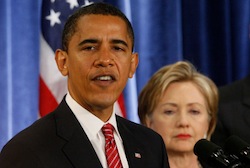Obama and Clinton: The NPT is More Important Than Ever
March 8, 2010
Featured Image
We are happy to serve you a daily summary of the day's top nuclear policy stories each morning, with excerpts from the stories in bullet form.
Stories we're following today:
Statements by President Obama and Secretary Clinton on the 40th Anniversary of the NPT - The White House [link] and the Department of State [link]
- Today, the threat of global nuclear war has passed, but the danger of nuclear proliferation endures, making the basic bargain of the Nuclear Nonproliferation Treaty (NPT) more important than ever.
- It took years of focused effort among many nations to bring the NPT into force four decades ago and to sustain it as the most widely embraced nuclear agreement in history.
- In the decades since, more states have relinquished nuclear weapons – or decided against pursuing them – than have acquired them, in large measure because of the international consensus embodied in the NPT.
- On this 40th anniversary, the United States reaffirms our resolve to strengthen the nonproliferation regime to meet the challenges of the 21st century as we pursue our ultimate vision of a world without nuclear weapons.
Obama Must Decide Degree to Which U.S. Swears Off Nuclear Weapons - Washington Post [link]
- President Obama's top national security advisers will within days present him with an agonizing choice on how to guide U.S. nuclear weapons policy for the rest of his term.
- After lengthy debate, Obama's aides have rejected some of the boldest ideas on the table, such as forswearing the option to use nuclear arms first in a conflict, or dropping one leg of the "triad" of bombers, submarines and land-based missiles that carry the deadly weapons.
- The Nuclear Posture Review is done at the start of each administration, and it influences budgets, treaties and weapons deployment and retirement for five to 10 years.
- More than two dozen Democrats, led by Sen. Dianne Feinstein (Calif.), chairman of the intelligence committee, have pressed Obama to adopt language saying the "sole" or "only" purpose of U.S. nuclear weapons is deterrence.
A Sober Approach to Sanctioning Iran - David Ignatius in the Washington Post [link]
- The Obama administration is struggling to craft a new round of U.N. sanctions against Iran that achieves more than this feel-good impact. The ambitious goal is "to cut off the revenues that fund Iran's nuclear and missile programs," says a senior administration official.
- To provide economic muscle for the push against Iran, the Obama administration is working closely with Gulf oil exporters.
- The trick for the Obama administration is to craft a sanctions plan that hurts the Iranian government without causing too much pain for the Iranian people. That's one reason the administration is wary of a congressional proposal for sanctions against Iran's imports of refined petroleum products -- a step that would probably harm the public more than the regime.
Iran: Cruise Missile Production Begins - Associated Press
- Iran said Sunday it has launched a new production line of highly accurate, short range cruise missiles, which would add a new element to the country's already imposing arsenal.
- Iran frequently makes announcements about new advances in military technology that cannot be independently verified.
- State TV showed a video of boxes in a warehouse containing several missiles. It also showed footage of Iran's cruise missile test in 2007. That missile was apparently imported.
The Lighter Side
The Bomb for Beginners: A Do-it-Yourself Guide to Going Nuke in a Few Easy Steps - Michael Rühle in IP Global [link]
- Tired of being bossed around? Want your neighbors to treat you with more respect? Want to play in the majors? If so, you have to have your own nukes.
- These simple steps have worked for the likes of Israel, Pakistan, and North Korea, among others. The nuclear club is open to your country, too.
- First, begin developing a civilian nuclear program...
- You will get caught, either by a US spy satellite (as in the case of North Korea), a disgruntled defector (as in the case of Iraq), or even an indigenous human rights group (as in the case of Iran). So what should you do if you get caught?



